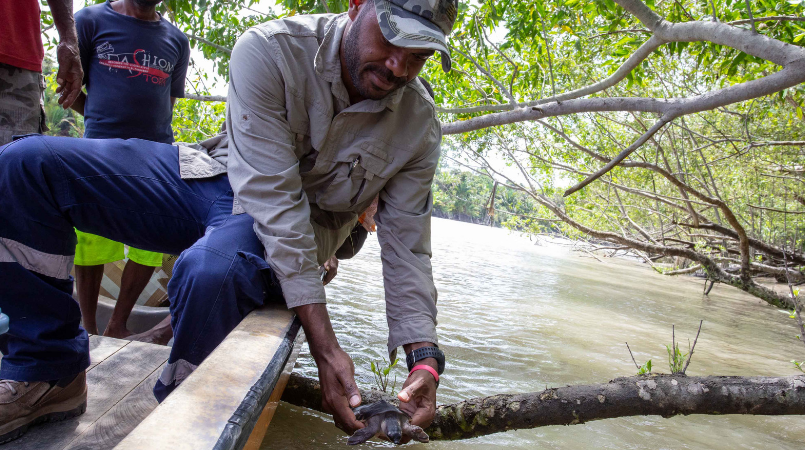
Fifteen endangered pig-nosed turtles have pioneered the first ever fresh water turtle wildlife release of its kind in Papua New Guinea.
The pig-nosed turtles made the trip from Port Moresby Nature Park in the capital to the Gulf Province via plane and then by boat where they were released into a side estuary of the Kikori River.
In 2015 the Nature Park ambitiously launched a number of animal breeding and research programs, including the commitment to take on 47 pig-nosed turtle hatchlings from the Kikori Delta region to study the growth rates of this little-studied species. The research project is being done in partnership with the University of Canberra and the Piku Biodiversity Network through direct sponsorship by ExxonMobil PNG.
The ‘head-start’ program was the first ever attempted initiative to study these species. The focus was on determining the turtles’ growth rates. This has required the Nature Park’s Wildlife Department to measure weekly the shell width and weight of each. In the wild, newly hatched turtles have about a one percent chance of survival to adulthood.
The pig-nosed turtles had been safely living and growing in the Nature Park free from predators until they have reached a size large enough to have a better chance of survival from one percent at birth to now up to thirty percent.
The next stage of the project was to return the turtles to their birth place. Accompanying the pig-nosed turtles on the trip back to Kikori was Conservation and Environment Protection Authority’s Wildlife, Trade & Enforcement Officer Nicho Gowep, Nature Park’s Wildlife Keeper Emma Oliver and professional photographer Vanessa Kerton from madNESS Photography.
Port Moresby Nature Park’s General Manager said: “The success of the release program was made possible through the support of one of our major partners, ExxonMobil PNG, through the Head Start Program in partnership with the University of Canberra. The Nature Park was able to research growth rates of the pig-nosed turtles since 2015 and we are delighted to see these turtles released back into the wild.”
Michelle McGeorge also added: “The Park will continue to spearhead programs like this to help ensure that we are doing our bit in preserving the wildlife of this beautiful land. This is research never undertaken before that we will publish in scientific journals to share valuable information to field researchers and conservationists and also to international organisations such as TRAFFIC, who closely monitor the illegal movements of pig-nosed turtles, particularly in SE-Asia where there is a lot of pressure on pig-nosed turtles.”
The remaining pig-nosed turtles at the Park will soon be joining those recently released. The second group to be released will also be radio tagged and tracked to monitor their movements when released.
(CEPA’s Wildlife, Trade & Enforcement Officer Nicho Gowep releasing a piku turtle)
